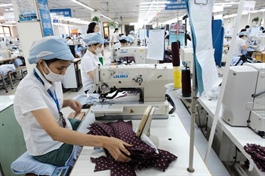High-value investment of prime importance to advance
High-value investment of prime importance to advance
Vietnam is leaning towards quality and more modern investing initiatives. Joon Suk Park, head of International Subsidiary Banking, Wholesale Banking at HSBC Vietnam, spoke to VIR’s Hong Dung about the key sectors for high-value funding in this country.
The Vietnamese government is focusing on high-value investment. How can high-value foreign direct investment (FDI) in particular support the nation’s economy?
Vietnam has over the years successfully transformed into an export-led economy where foreign-invested enterprises (FIEs) create more than 70 per cent of the country’s exports.
The manufacturing sector, particularly electronics and textiles and garments, has been the key driver. High value investments cover a broad range of sectors including semiconductors, renewables, electric vehicles (EVs), logistics, data centres, fast-moving consumer goods, and higher education. These are value-added industries poised to take Vietnam to the next level of qualitative growth.
Vietnam has over the past 35 years learned and experienced the benefit of establishing a manufacturing supply chain ecosystem. The strategy to focus more on high-value FDI attraction is absolutely the right direction, and it’s commendable.
Focusing to encompass and comprehensive build out of the relevant regulatory and operational landscape is conducive to attracting those sectors that are very important. There are many forms of incentives beyond tax, and these include areas where many multinationals would place considerations before making decisions.
Firstly, they must consider whether there is a promising outlook for those high-value sectors, including the availability of related sector local suppliers. Second is whether there are efforts being placed in the country to forge a sustainable ecosystem surrounding those sectors is key. Third is the availability of quality resources, especially in the fields of engineering and research and development. Last is transparency of corporate governance and regulations.
In Vietnam, which sectors are most attractive for high-value FDI?
There are several characteristics or market motivating features that the Vietnam brand has been able to garner over the years, and these will help to define what the most attractive sectors are.
By 2030, Vietnam’s domestic consumption market will be bigger than of the UK, Germany, and Thailand, and it will rise to the ranks of the top 10 globally. This is backed by the growing middle-income class and a young, tech-savvy population.
Segments such as e-commerce, data centres, fast-moving consumer goods, and higher education will all be relevant sectors. Vietnam is also blessed with favourable natural conditions enabling the success of the wider renewables sectors. Vietnam has also learned from the past 35 years of experience and knowledge to establishing manufacturing supply chain ecosystem and this will support the attraction of high value added FDIs beyond electronics and into sectors such as the semiconductors and the wider EV industry.
With the government focusing more on high-value FDI, do you think this will limit Vietnam’s opportunities in attracting other types of investment?
Focusing on high-value FDI is absolutely the right direction to pursue from a strategic point of view. And for this to be realised, the relevant infrastructure and supply chain ecosystem needs to be set in motion. However, at the same time, the wider FDI across various sectors and industries is still very much relevant to the success of the Vietnam story.
Establishing the electronics manufacturing ecosystem has taken many years. In the early 2000s, the export of electronics goods was less than 5 per cent of total exports. Today, it accounts for more than 35 per cent.
Accordingly, we should both avoid the perception Vietnam focusing largely on high-value added FDI as well as de-risk any potential gaps in inflow, which is paramount to the country’s exports as well as the wider economy.
How can HSBC support FDI and ensure it flows into those sectors?
HSBC Vietnam can provide an effective support in laying the nexus for high-value FDI to flow into the country. Our vast international network allows a broad focus and engagement of those international multinationals considering making entry into Vietnam.
We have also been operating across wholesale and retail banking. With a deep footprint of over 150 years in the country, the bank has gained local market insights as well as placing us in a position to advise global and regional multinational companies effectively in navigating the journey.
The bank is also proud to be a market leader in sustainable financing across the different regions and will continue to play a meaningful role in building the sustainability landscape in the country.

























